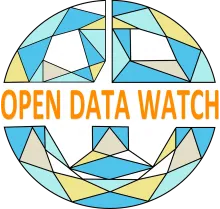This piece was originally published on the Open Data Watch blog.
Work by Open Data Watch on open data, statistical capacity building, and financing for data and our research on evidence for the value, use, and impact of data has shown that making the case for increasing investments in data is a tough job. Why do investments in data remain low, despite the often cited need for high-quality data to guide policies and promote evidence-based decision making for sustainable development? We have found multiple, connected reasons. Poor linkages between data production and impact. Lack of strong evidence for the value of data. And lack of political attention and support for investments in data. Our data impact and data value work-stream focuses on finding ways to overcome these issues and create a body of knowledge that can be used to make a better case for investments in data by showing the impact of data on people’s lives.
Here are a few examples.
- Case studies of data impact: In 2015, Open Data Watch, with Bapu Vaitla as the lead author and the support of the Hewlett Foundation, published “Data Impacts: How the Data Revolution is Making a Difference.” The goal of Data Impacts was to explore success stories (and instructive failures) in the ongoing data revolution. After an initial scoping exercise, reinforced by expert interviews and an extensive review of print and online materials, the Data Impacts project identified over 80 candidate cases. From these, outstanding cases were selected on the basis of rigorous impact measurement, the scale of impact, and the potential relevancy of lessons learned to others. Drawn from countries around the world, the case studies span a wide range of themes, including health, agriculture, the environment, urbanization, and humanitarian crises.
- Data impact repositories and data impact examples: The question – under what conditions do data lead to use and impact? – has been posed by many organizations working in the data sector. Our initial desk research working with Data2Xincluded a scan of who was doing what and where. This work resulted in what we call a meta-repository – an inventory of organizations who have compiled case studies as well as an analysis of the repository itself. The inventory includes an evolving list of 15 websites that document the impact of data, including GovLab’s Open Data’s Impact, the Center for Open Data Enterprise’s Open Data Impact Map, and Australia National Data Service’s #dataimpact: Stories about the real-life impact of Australian research data. Documenting individual examples of data impact, which may serve as future case studies of data demand, use, and impact, are also included in this research. Our goal is to develop a more nuanced understanding of the processes and factors underlying the value of data.
- Crowdsourced examples of gender data impact: Between January 17th and March 8th, Open Data Watch and Data2X, in partnership with Devex, ran a global call for gender data impact stories. During the open period for submissions, two one-hour Gender Data Impact info sessions were held. These offered organizations a time to call in, learn more about the project, and pose questions they had about the definition of impact and the submission process. The call for stories closed with 59 submissions. The stories are now undergoing expert review. More information will be requested from the organizations who submitted stories that hold the greatest promise for demonstrating the impact of gender data. The goal is to highlight the importance of investing in gender data and motivate decision-makers to use gender data to improve the lives of women and girls.
- Documenting examples of the value of data: As part of the Global Partnership for Sustainable Development Data’s (GPSDD) ongoing work on more and better financing for data, we are researching examples that demonstrate the value of data. Our initial investigation found different approaches to evaluating the costs and benefits of investing in data. Several attempts have been made to estimate data investment costs relative to population, GDP, government budgets, or official development assistance (ODA) to support the argument that data is a small proportional amount of government spending but can provide many benefits. More complex approaches monetize a proportion of known benefits from data products like the census and compare this to their cost of production. Other attempts have been made to assess the effect of data availability and well-functioning statistical systems on economic or social outcomes, such as increases in GDP; economic benefits derived from the commercial use of open data; cost savings and improvements in social indicators from data-driven policies; and, conversely, the economic and social consequences of poor quality data. Aside from providing case studies for data impact, the inventory is a summary of how the data community is monetizing, measuring, and conceptualizing value and impact and the tools and methodologies they are using.
- Utilizing the data value chain to better understand value and impact: The path from data to impact can be long and complex. Crucial improvements can happen at every stage of data process – from generation and collection to use and impact. Present and future initiatives can benefit from understanding the technical, logistical, and political factors that drive success and threaten failure at each stage. In an effort to improve our understanding of this complex issue, we created the data value chain — a tool that can be used to structure the process data undergo from collection to publication to uptake to impact. The tool is used to help frame thinking and discussions around the value of data and data impact examples. The report, completed in partnership with Data2X, showcases examples of data impact at each stage of the data value chain — collection, publication, dissemination, and impact.
Understanding the life cycle of data and documenting cases of data impact is not a job for one organization alone. Fully grasping such a complex subject requires collaboration, partnerships, and knowledge sharing. An exchange of ideas, theories, and case studies can inform our understanding of how data gain value from production to use and impact. Our ongoing research can help others better understand the data value chain, provide potential case studies for documenting the impact of data, or assist in advocacy efforts for more and better investments in data. Our goal is to continue to partner with and support organizations working to build a public body of knowledge that can improve the use and impact of data for sustainable development.
Are you also working on documenting the value and impact of data? Do you have ideas for where ODW’s work on data impact can be applied? Please contact us at info@opendatawatch.com. We would love to hear from you.

